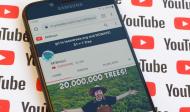Natalie Wynn: "I believe in the power of intellectual empathy"
Her YouTube channel ContraPoints is currently followed by 1.6 million people, making it one of the largest with philosophical content. In this interview, Natalie Wynn talks about the power of performance, her transition and dealing with hate.
You describe yourself as an Ex-Philosopher who became a Youtuber. How do those two things go together?
Let’s start with Ex-philosopher. I was a PhD student in Philosophy, preparing an academic career. But it wasn’t for me. If you are the kind of mind that can be obsessive about one thing for years, then it's great. But – maybe the derogatory way would be to say – that I'm shallow. I'm a big picture person. We live in this world where there's so much going that is so dire politically and culturally. Possible Worlds Ontology doesn’t get me as excited.
How did you get engaged with the real world after you dropped out?
For long, I wanted to be an artist. In my first two undergraduate years, I was a piano student. But at some point, the 12-year-old virtuosos decided: you know what, I'm out, I can't do it. Then, years later, when I dropped out of Grad school, I wanted to write fiction. In order to support myself, I was driving Ubers, teaching piano lessons and doing whatever menial jobs. But I never really got anywhere with writing.
And then you finally discovered a place where you could combine all your interests: Youtube!
You see, I'm a 33-year-old millennial. I have spent a lot of my life on social media. Then, in 2015 YouTube was getting political in an extremely far-right way. Millions of people were starting to watch videos about how feminism is cancer or on how Black Lives Matter was an anti-white terrorist organization. I thought I might be someone who could have something to say in this space that might make a difference. In retrospect, I was right.
Clearly so: you currently have more than 1,6 million people following your Youtube-Channel Contrapoints, which features videos of philosophical and left political content. What do we get so see on your channel that people are so fascinated by?
When I first started out, I was fixated on writing refutations of new right-wing movements. I started with simple arguments around claims such as: no, the United States should not be a white nationalist country. It seemed to be needed at the time.
Later, you switched from to the topic of gender identity, a topic that strongly relates to your own personal life as a trans woman who was assigned “male” at birth.
In 2017, I realized that I needed to transition. After this, I started doing a lot of content about trans topics, as many trans people in the early stages of their transition do. But also, there was need for public education about this topic because many people are curious but don't know anything and are also being fed a lot of hateful propaganda on the topic.
You decided to use your YouTube channel to do educational work on this topic, by sharing long format Video essays, in which you use your philosophical background. How do you think philosophy can help to understand why societies react so strongly to trans people’s situation?
The situation of trans people can in fact be linked back to a universal philosophical theme. It reveals what identity really is: contingent and impermanent. People find that threatening. A person can lead their life as a man for decades and still become a woman and live a woman’s life at some point. However, it doesn’t really take a trans person to shed light on this. It has been one of the basic ideas of Buddhism for thousands of years. In the Western philosophers’ tradition, we can think of David Hume who says that the self is an illusion: it's just this bundle of impressions tied together. The idea that there would be anything such as the self is a mirage.
So, you are saying that everyone’s identity is not something fixed but it changes all the time?
Philosophie Magazin +

Testen Sie Philosophie Magazin +
mit einem Digitalabo 4 Wochen kostenlos
oder geben Sie Ihre Abonummer ein
- Zugriff auf alle PhiloMagazin+ Inhalte
- Jederzeit kündbar
- Im Printabo inklusive
Sie sind bereits Abonnent/in?
Hier anmelden
Sie sind registriert und wollen uns testen?
Probeabo
Weitere Artikel
Natalie Wynn: „Ich glaube an die Kraft intellektueller Empathie“
Ihrem YouTube-Kanal ContraPoints folgen aktuell 1,6 Millionen Menschen, was diesen zu einem der größten mit philosophischen Inhalten macht. Im Interview spricht Natalie Wynn über die Kraft der Inszenierung, ihre Transition und den Umgang mit Hass.

Der König des Kindness Contents
Der YouTuber MrBeast verdient mit guten Taten Millionen. Weil er es schafft, dass sich Zuschauer als Helfer fühlen können, deren Klicks die Welt verbessern.

Dicke Schlappen, volle Power
Ob auf YouTube, am Kiosk oder auf Messen: Die Begeisterung für Traktoren, Mähdrescher und Güllemaschinen boomt. Wie lässt sich diese wachsende Faszination für Landtechnik erklären?

Wiederkehr des Archaischen
Jüngst wurde der YouTuber Rainer Winkler alias „Drachenlord“ zu zwei Jahren Haft verurteilt, weil er handgreiflich wurde gegenüber Hatern, die ihn in Scharen tyrannisieren. Wie lässt sich das Unfassbare fassen?

Michael J. Sandel: "Wir haben Angst vor der Idee des guten Lebens"
Michael J. Sandel ist der Rockstar unter Amerikas Moralphilosophen. Mit seinen Vorträgen füllt der Harvard-Professor ganze Stadien. Über YouTube fasziniert er ein Millionenpublikum weltweit. Das Denken des Rawls-Schülers kreist um die Frage, wie die voranschreitende Ökonomisierung der Gesellschaft unser moralisches Empfinden verändert – und zunehmend verarmen lässt
Hands Up! This is the State!
Latin America is a place of longing, a political laboratory and a philosophical terrain that often remain somewhat in the shadows of its northern neighbors. Unjustly, as we want to show in our series on the subcontinent. Fernando Morra and Anahí Wiedenbrüg explain why Argentinians, despite extreme poverty, support a president who wants to abolish the state.

Empathie-Erschöpfung
Wenn das Leid in den Nachrichten zunimmt, vermag das zum Empathy Distress führen. Die Folge: moralischer Burn-out.
Issa Kohler-Hausmann: “We won’t get any further by simply insisting that people ought to be treated ‘the same’”
With its recent ruling, the US Supreme Court outlawed ethnic and racial preferences in colleges admissions. Yet what that means in practice is unclear, says Issa Kohler-Hausmann, professor at Yale University. A conversation about competing notions of equality and the possible consequences of the ruling.
